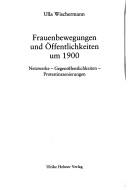| Listing 1 - 10 of 75 | << page >> |
Sort by
|
Book
Year: 1901 Publisher: Berlin : W. Moeser,
Abstract | Keywords | Export | Availability | Bookmark
 Loading...
Loading...Choose an application
- Reference Manager
- EndNote
- RefWorks (Direct export to RefWorks)
Book
ISBN: 3406562639 9783406562631 Year: 2009 Publisher: München : Beck,
Abstract | Keywords | Export | Availability | Bookmark
 Loading...
Loading...Choose an application
- Reference Manager
- EndNote
- RefWorks (Direct export to RefWorks)
Feminism --- Feminism. --- Frauenbewegung. --- History.
Book
ISBN: 9172672447 9789172672444 Year: 2007 Publisher: Lund : Lund university press,
Abstract | Keywords | Export | Availability | Bookmark
 Loading...
Loading...Choose an application
- Reference Manager
- EndNote
- RefWorks (Direct export to RefWorks)
Book
ISBN: 1784780529 9781784780524 Year: 2015 Publisher: London : Verso Books,
Abstract | Keywords | Export | Availability | Bookmark
 Loading...
Loading...Choose an application
- Reference Manager
- EndNote
- RefWorks (Direct export to RefWorks)
"An international bestseller, originally published in 1970, when Shulamith Firestone was just twenty-five years old, The Dialectic of Sex was the first book of the women's liberation movement to put forth a feminist theory of politics. Beginning with a look at the radical and grassroots history of the first wave (with its foundation in the abolition movement of the time), Firestone documents its major victory, the expansion of the franchise in 1920, and the fifty years of ridicule that followed. She goes on to deftly synthesize the work of Freud, Marx, de Beauvoir, and Engels to create a cogent argument for feminist revolution. Ultimately she presents feminism as the key radical ideology, the missing link between Marx and Freud, uniting their visions of the political and the personal. The Dialectic of Sex remains remarkably relevant today - a testament to Firestone's startlingly prescient vision. The author died in 2012, but her ideas live on through this extraordinary book"--Unedited summary from book cover.
Feminism --- Feminism. --- Feminismus. --- Feminist theory. --- Frauenbewegung. --- Sexualität. --- United States.

ISBN: 3897411210 9783897411210 Year: 2003 Publisher: Königstein : U. Helmer,
Abstract | Keywords | Export | Availability | Bookmark
 Loading...
Loading...Choose an application
- Reference Manager
- EndNote
- RefWorks (Direct export to RefWorks)
Feminism --- Feminism. --- Frauenbewegung. --- Social movements --- Social movements. --- Öffentlichkeit. --- History --- 1900-1999. --- Geschichte 1894-1914. --- Deutschland. --- Germany.
Book
ISBN: 9783038100065 Year: 2015 Publisher: Zürich : Neue Zürcher Zeitung,
Abstract | Keywords | Export | Availability | Bookmark
 Loading...
Loading...Choose an application
- Reference Manager
- EndNote
- RefWorks (Direct export to RefWorks)
Feminism --- Women --- History --- Suffrage --- Gostelli, Marthe. --- Archiv zur Geschichte der Schweizerischen Frauenbewegung --- History.
Book
ISBN: 9789178448920 Year: 2014 Publisher: Möklinta : Gidlunds förlag,
Abstract | Keywords | Export | Availability | Bookmark
 Loading...
Loading...Choose an application
- Reference Manager
- EndNote
- RefWorks (Direct export to RefWorks)
Frauenbewegung. --- Frauenzeitschrift. --- Women's periodicals, Swedish --- Women's periodicals, Swedish. --- History. --- Schweden.
Book
Year: 2022 Publisher: Baden-Baden Nomos Verlagsgesellschaft mbH & Co. KG
Abstract | Keywords | Export | Availability | Bookmark
 Loading...
Loading...Choose an application
- Reference Manager
- EndNote
- RefWorks (Direct export to RefWorks)
This first comprehensive study of heroism and the heroic in “Doctor Who” (1963-2020) uses one of Britain’s longest-running TV series to access the changing state of the nation and its collective emotions since the early Sixties. The analysis of two decade-spanning processes of heroization (of the Doctor and female characters in the series) is combined with close readings of individual episodes that feature heroic moments in crystallized narratives of past and future. Nostalgic collective memory, female empowerment and key moments of British history (e.g. World War II) all resonate in the series, which shows how popular heroes negotiate socio-cultural change and identity construction.
Book
ISBN: 3657788042 3506788043 Year: 2018 Publisher: Paderborn Brill | Schöningh
Abstract | Keywords | Export | Availability | Bookmark
 Loading...
Loading...Choose an application
- Reference Manager
- EndNote
- RefWorks (Direct export to RefWorks)
,Verschnarchte Provinz' versus ,revolutionäre Großstadt'? Gab es die ,68er', die Friedens-, Umwelt-, Frauen- oder Jugendbewegung auch außerhalb der Metropolen? Historische Studien zur Durchsetzung demokratischer Teilhabestrukturen in der Bundesrepublik unterstellen der ,Provinz' oft kaum oder kein emanzipatorisches Potential. Auch Forschungen zu den Neuen sozialen Bewegungen der 1960er bis 1990er Jahre blicken nur selten über Frankfurt, Berlin oder München hinaus. Dieser Sammelband fragt daher nach der Entstehung, den Einflüssen, den Verhinderungen sowie den Erfolgen dieser Bewegungen in ländlichen Räumen. Die Beiträge fragen kritisch, welche Bedeutung der Zuschreibung ,Provinz' bislang bei der Erforschung von Bewegungskulturen in kleinstädtischen und ländlichen Gesellschaften zukam. Zum anderen wird überprüft, ob für die Handlungs- und Diskursräume in der ,Provinz' von Eigenlogiken gesprochen werden kann. Und sind Angleichungsprozesse und/oder wechselseitige Einflussnahmen von Metropolen und ,Provinz' auf die Entwicklung sozialer Bewegungen festzustellen?
1968 --- Bundesrepublik Deutschland --- Emanzipation --- Frauenbewegung --- Jugendbewegung --- Lippe --- ländlicher Raum --- Partizipation --- Umweltbewegung --- Westfalen
Book
Year: 2022 Publisher: Baden-Baden Nomos Verlagsgesellschaft mbH & Co. KG
Abstract | Keywords | Export | Availability | Bookmark
 Loading...
Loading...Choose an application
- Reference Manager
- EndNote
- RefWorks (Direct export to RefWorks)
This first comprehensive study of heroism and the heroic in “Doctor Who” (1963-2020) uses one of Britain’s longest-running TV series to access the changing state of the nation and its collective emotions since the early Sixties. The analysis of two decade-spanning processes of heroization (of the Doctor and female characters in the series) is combined with close readings of individual episodes that feature heroic moments in crystallized narratives of past and future. Nostalgic collective memory, female empowerment and key moments of British history (e.g. World War II) all resonate in the series, which shows how popular heroes negotiate socio-cultural change and identity construction.
| Listing 1 - 10 of 75 | << page >> |
Sort by
|

 Search
Search Feedback
Feedback About UniCat
About UniCat  Help
Help News
News